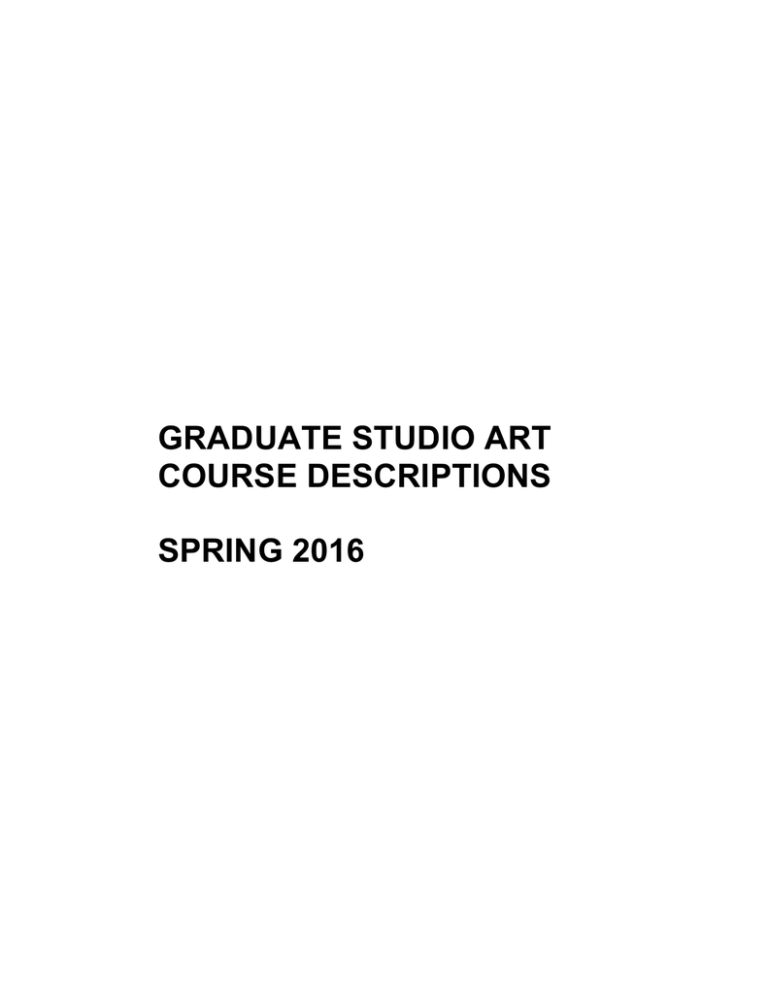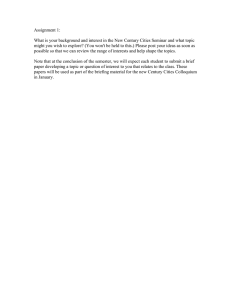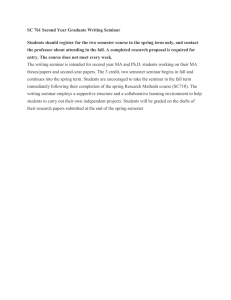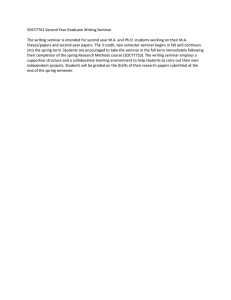GRADUATE STUDIO ART COURSE DESCRIPTIONS SPRING 2016
advertisement

GRADUATE STUDIO ART COURSE DESCRIPTIONS SPRING 2016 ARTCR 640-642 (5824, 5827, 9534) Nari Ward Monday 12:20-3:00 Graduate Drawing I-III Description not provided by professor. ARTCR 640-642 (9528, 9531, 9537) Lisa Corinne Davis Thursday 3:20-6:00 Graduate Drawing I-III This course helps students form a studio practice that enables them to critically evaluate, understand and develop their work through the investigation of different drawing conventions, issues in contemporary drawing, and study of the historical framework relevant to their own work. At least three drawings are due each week, sometimes in response to a specific drawing assignment. Class discussions will be driven by groupings of conventions of the drawings as they appear in the student’s work, and could cover the following: • Definition of drawing • Communication through • The kinetic basis of drawing • Drawing and realization • Definition of form and analytical structure • The fallacy of abstraction • Context and content • Structure as relationship • Supports, materials and their significance • Technical methods • Rhythm and Space • The subject: Its nature and function • The different kinds of drawing • Architectural drawing • Animation and comic drawing • Ways to portray cinematic narrative in a picture • Horror and the grotesque in contemporary art. ARTCR 661 (73389) A.K. Burnes Wednesday 12:20-6:00 Combined Media Elective This class is dedicated to building an exquisite corpse of thought and practice that examines the role of the body in contemporary art. From toe to head and from mouth to anus, we will dissect and reconfigure our perception of the interior and exterior territories of the body. Students will be expected to develop the physical and emotional resonance of their individual practices through a variety of body centric principles such as gesture, scale, materiality, the sensory system, form and formlessness. We will explore a cross-pollination of non-artistic influences and conditions placed on the body by society, culture and politics—considering topics as diverse as fitness, pharmaceuticals, medicine, prosthesis, sexuality, race, confinement, ableism and labor. Students participating in this class may work within any medium; performance, video, photography, drawing or sculpture but should have an invested interest in expanding their formal and conceptual relationship to notions of the body. ARTCR 662-665 (9543, 9561, 9579, 9597) Carrie Moyer Thursday 9:20-12:20 Graduate Seminar Painting, drawing and the issues surrounding the two-dimensional form the core of this graduate seminar. Through group conversation, reading and critique, students will hone their ability to identify and articulate the personal, formal, conceptual and historical cues embedded in two-dimensional artwork. Emphasis will be placed on observing and analyzing the conditions and context for the artist’s own work and, by extension, that of others. The rhetorical skills necessary for arguing one's own point of view will be refined through frequent writing projects. The student is expected to be responsive to the input from the class, ultimately using this new information toward an expanded studio practice. Students are expected bring NEW work for critique three times over the course of the semester. Therefore a focused, energetic, high-level studio practice is the baseline for success in this course. ARTCR 662-665 (9546, 9564, 9582, 9600) Daniel Bozhkov Monday 3:20-6:00 Graduate Seminar Description not provided by professor. ARTCR 662-665 (9552, 9570, 9588, 9606) Valerie Jaudon Thursday 3:20-6:00 Graduate Seminar This seminar will conduct in-depth critiques of the work of individual students. There is no limitation on the type of work to be considered. The overall goal of the course will to build a common, comparative critical vocabulary based on issues raised by student work. During the course of the semester each student will present their work at least twice, and the work will be the subject of in-depth analysis by the group. Each class we will focus on at least two presentations of student work, and a portion of the class will be devoted to discussion of current exhibitions, relevant critical readings and student reports. Emphasis will be placed on each student’s conceptualization of his or her work in a broad cultural context, and the use of careful description leading to an analytic interpretation of work will be crucial. This will set the stage for the consideration of student work in the light of current conditions, as a means of concretely evaluating the roles and options available to contemporary artists. ARTCR 662-665 (9549, 9567, 9585, 9603) Susan Crile Tuesday 3:20-6:00 Graduate Seminar Description not provided by professor. ARTCR 662-665 (73392, 73393, 73398, 73399) Andrea Blum Monday 6:10-9:00 Graduate Seminar Work/ Display/Essay Every work of art is needs to consider the context in which it is installed, be it a gallery, institution or on the street. This seminar is dedicated to analyzing methods of display to compliment, dictate, and invite the viewer into a dialogue with the work. There will be 4 presentations this semester that will break down the process. Identifying concept; framing the ideas in the work in the context of other artist/filmmakers/writers etc working with the same subject; developing an exhibition design for the work; writing an essay to accompany the final maquette. We will analyze images of former exhibition designs that have relevance to the work of each student, and critique the methods of display of current exhibitions in the city. ARTCR 751.28 (9995) Joel Carreiro Tuesday 12:20-3:00 Collage Logic Collage is central to contemporary artistic practice and centers on the conflation of different images, elements and processes. "Collage Logic" assumes an expanded scope of the category such that we follow collage and photomontage into an array of digital practices and time-based work, and consider the development of assemblage into combined media works and installation. We will consider all works that can be said to emanate from a "collage logic" and we welcome collaborative efforts as well. This class functions within a seminar format so each student presents work which will be the subject of in-depth analysis by the group. Students will also write reviews of each others work. Relevant exhibitions and critical readings will be discussed. There is a one-sentence homework assignment due by the end of the semester - trickier that it sounds! ARTCR 751.30 (73986) Paul Ramirez Jonas Friday 12:20-3:00 The Hidden Curriculum Dear MFA students, I (Paul Ramirez Jonas) will be offering an unusual elective this Spring semester called The Hidden Curriculum. The course will have funding through a Mellon Foundation initiative; and will be open to other CUNY MFA students. The members of this class will work together in a project that will be presented at Open Engagement 2016. We will probably have the funding to fly representatives of the seminar to Oakland to attend and participate. http://openengagement.info/oakland-2016/ The course will also represent a collaboration with SOMA, the independent school in Mexico City. They will put their archives at our disposal and most likely form a similar working group at their end to collaborate with us. http://somamexico.org/en The course is by permission of the instructor only. If you are interested send me an email telling me a little about yourself, why you are interested in the project, etc. Do it as soon as you can so I can put you in the course. There are already 4 spots taken by non Hunter MFAs. My email: paul.ramirez.jonas@gmail.com Wait… what is the course you ask? Please read: The Hidden Curriculum Spring 2016 Friday12:20 - 3:00 205 Hudson, Hunter MFA building The Hidden Curriculum will be a working group where students and faculty will create a pilot on-line audiobook library of essential texts for artists. These readings will gather an alternative to the usual set of writings read in graduate and undergraduate programs in the USA. The Hidden Curriculum will assemble a diverse set of texts that are deemed central to artistic production by groups from different cultures, ethnicities, languages, gender identities, and geographies. To achieve this multiplicity and diversity this will be a translation project. The first translation will take place when the written texts are spoken out loud; translated from print into the students individual voices –and in their own words. Working in collaborative teams, class participants will contribute up to four recordings: A text from their culture, translated into colloquial english. The same text, in its original language. An original english text, translated into the contributors native language. The original english text, in colloquial english. The concept of translation and language should be understood in the broadest, most creative and expansive way. For example, someone may translate a 19th century text into contemporary slang -a translation across time. Or someone may argue that hacking is essential to our culture and that a certain text from that sub-culture needs to be part of this curriculum -and sing it. Or someone may translate a Korean, Spanish, or Portuguese text into colloquial English -and vice versa. This library would be addressed to other artists, who would download the texts and listen to them as they work. The CUNY graduate student body is an ideal constituency to pilot this project; as they represent the type of diversity that the project wants to support and platform. This seminar will have funds from the Mellon Foundation that will be used to enhance our activities. The original is unfaithful to the translation. ―Jorge Luis Borges Questions to be tackled and solved in class: What does fidelity to the original mean? How does one deal with issues of accent? Are contributors invited, or is it a completely open platform? Is quality supervised and maintained, by whom, and by what standard? Should there be technical and/or stylistic guidelines? What should they be? Should this be an open platform or by invitation only? We are going to try to make a real thing… not just an exercise. ARTCR 751.19 (5839) Jeff Mongrain Monday 12:20-3:00 Sculpture Methods SCULPTURAL METHODS CLASS, with Jeffrey Mongrain MFA, Fall 2014 Tuesdays 12:20 to 3:00 The first 5-6 weeks of the semester are full-class demonstrations with related slide presentations of the following processes. -Metal Working (3 different construction processes, new equipment has been purchased) - Laser Etching - 3-D Printer (Up to a 10 inch form, available Fall 2014) - Lamp Working/Torch (New Process) - Woodworking (Advanced techniques and construction methods) - Electronics (small motor construction and kinetic related devices) - Mold Making (Rubber molds, Plaster molds, Relief Molds…) - Mold Making for off-site casting of bronze and glass. - Casting (plastics, rubber, clay, dirt, salt,…) - Large scale fiber-glass construction - Photography Decal Transfer (for Glass and Ceramics) - Gold, Silver, Aluminum Leafing. - Ceramic Processes (Slab, Coiling, Glazing, Firing,…) - Additional demonstration are by student request. The next 3 weeks are individual tutorials discussing projects and individual shop assistance from the 4 support staff. The last 7 to 8 weeks of the semester follows a Seminar Class format with group critiques. Every student presents their work twice along with images of influential artists or current exhibitions. ARTCR 751.57 (9914) Andrew Mockler Wednesday 3:30-6:00 Projects in Graphics Description not provided by professor.



